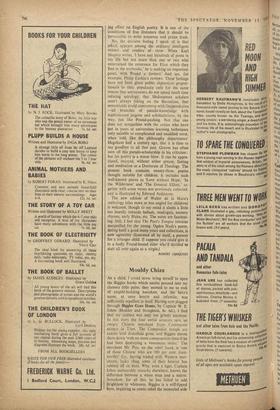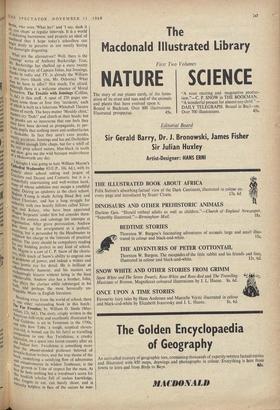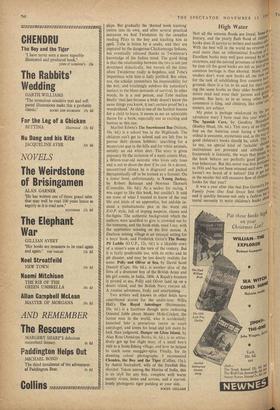Mouldy Chizz
As a child, I could never bring myself to open the Biggles books which uncles pressed into my clammy little palm; they seemed to me to reek of empire-building boredom, and the hero's name, at once hearty and infantile, was sufficiently repellent in itself. Having now slogged through Biggles Goes Home, by Captain W. E. Johns (Hodder and Stoughton, 8s. 6d.), I find that my instinct was only too grimly accurate. In this story the four awful aviators save an emigre Chinese merchant from Communist seizure in .Tibet. The Communist troops are sadists with diabolical grins, and Biggles shoots them down 'with no more compunction than if he had been destroying a venomous snake.' The merchant Mr Poo, on the other hand, is 'one of those Chinese who are 100 per cent. trust- worthy' (i.e., having traded with Western mer- chants, lucky chap, some of their honour has rubbed off on him). Why, even a tiger, Captain Johns memorably remarks elsewhere, knows the difference between a white man and a native. Somehow, for all this, he has failed to add brightneSs to whiteness. Biggles is a stiff-lipped bore, requiring as comic relief the monocled aide THE SPECTATOR. NOVEMBER I t Bettie, who cries 'What ho!' and 'I say, dash it all You chaps' at regulir intervals. It is a world 01 sickening barrenness, and projects an ideal of manhood that I hope today's schoolboy can gin dimly to perceive as not merely boring but downright disgusting. , What are the alternatives? Well, there is the ir, flings' series of Anthony Buckeridge. True, Buckeridge has chalked up a mere twenty rising sixty of Captain Johns, but Jennings, thanks to radio and TV. is already the William de 11°s lours (thank you, Mr. Osborne). Wh.at does he have to offer? Not much, I'm afraid. Persuasion there is a welcome absence of Moral ersoasion, The Trouble with Jennings (Collins, ,ty. : 6d.) is thin stuff. A span of 250 pages em- {A r,r,aces some three or four tiny 'incidents,' each s 0 , Which is buil to a hitehall Thea tr hek tinal of mirth.t The boyslaborious mutterW 'Mouldy chizz,e, re0
masters cry 'Doh!' and clutch at their heads; but the the Pranks are so innocuous that one feels they the must have been devised as propaganda, to per- 1cade pupils that nothing more anti-authoritarian
thinkable. In fact they aren't even pranks, merely accidents. Jennings and has pal Darbishire are decent enough little chaps, but for a whiff of the real prep school nature, blue-black in tooth het ofd claw, give me the wild baroque malevolence e ina Molesworth any day I thought I was going to hate William Ma.yne its esoteric (0.U.P., 10s. 6d.), with ts i .°leric choir school setting and jargon of Crucifers and Decani and Cantoris; but it is a wonderfully entertaining and well-written book, ..0 Bader of whose subtleties may escape a. youthful A-:`,ar. During an epidemic at the choir school. sf,"`1i.ow Young is made Acting Head Boy and Chorister, and has a long struggle for 4Y authority with two beastly fellows called Silver- )01( man and Kelsey, who have been appointed Plague agne Sergeants' under him but consider them- 1i sol •Ve8 his seniors and sabotage his attempts at organisation. After grave provocation, Andrew
6d Putsthem up for arraignment at a prefects' meeting, but is persuaded by the Headmaster to _Itbdraw his charge in the interests of practical i;olities. The story should be compulsory reading
Mr.ny budding prefect in any of schoo. I. te,:' "'One is a sort of C. P. Snow of the chons- i `s, with much of Snow's ability to engross one Problems of power, and indeed a wittier and so,nre poetic eye for detail. Hc is brilliant at e`h"elmasterly humour, and his masters are ,i"eLhantingly bizarre without being in the least unbelievable. Andrew also has a brother, John., b.,,(2 Plays the clarinet while submerged in his IC", and perhaps the most heroically un- aPPable Mum in English literature.
keaking away from the world of school, there the other outstanding book in this batch: Far Frontier, by William 0. Steele (Mac- A an, 12s. 6d.). The story, crisply written in the prInicrican folk-style and excellently illustrated by
Galdone, is set in Tennessee in the 1790s, ce'd tells bow Tobe, a tough, sceptical eleven- co'll'old, is bound out (to his fury) as travelling tt Panion to one Asa Twistletree, a cranky ordturanst, on a quest into forest country after an luth, Indian fort. Twistletree is something more .the absent-minded professor beloved of avende-fiction writers, and the true theme of the ndk, underlying a satisfying flow of adventures slo Misadventures in wildest Tennessee, is the fi.._w growth in lobe of respect for the man. At tilist he feels nothing but a woodman's scorn for who bookish scholar full of useless knowledge, ° forgets to eat, can barely shoot, and is virtually helpless in face of the nature he wor-
ships. But gradually the `durned book learning' comes into its own, and after several practical instances we find Twistletree by the campfire reading Pliny to the boy and teaching him to spell. Tobe is bitten by a snake, and they are captured by the dangerous Chickamauga Indians, but eventually released thanks to Twistletree's knowledge of the Indian mind. The good thing is that the relationship between the two is not just developed didactically, but wavers all the time; often Twistletree really is hopeless, and Tobe's impatience with him is fully justified. But often, too, the scholar remembers his responsibility for the boy, and touchingly subdues his naturalist's instinct to the blunt demands of survival. In other words, he is a real person, and Tobe realises finally 'that just because a body doesn't know the same things you know, it isn't certain proof he's a woodenhead.' As this is one of the hardest lessons for a child to learn, it seems to me an admirable theme for a book, especially one as exciting and human as this one.
Maribel Edwin's The Snowbound Bus (Nelson, 10s. 6d.) is a school bus in the Highlands. The children can't get to school and are left free to pursue their chosen hobbies: searching for a mysterious gap in the hills and for white animals, notably an old white deer. The story is given piquancy by the inclusion of a nasty cousin Max, a fifteen-year-old neurotic who loves only trees and is out to shoot the deer if he can. In a decent, uncontrived climax he is disgraced and packed therapeutically off to be trained as a forester. On a lower level, unfortunately, is Young Jockey, by Robert Bateman and Norman Thornett (Constable, 10s. 6d.). As a sucker for racing, I was eager to like this book, but couldn't. It told me none of what I wanted to know of the real life and trials of an apprentice, but unfolds in- stead a melodramatic plot in the worst old B.O.P. style, full of doping suspects, chases and fist-fights. The authentic background which the authors were qualified to give is crowded out by the nonsense, and the book ends, need 1 say, with the apprentice winning on his first mount. A Durham mining village is an unusual setting for a boys' book, and Frederick Grice's The Bonny Pit Laddie (O.U.P., 12s. 6d.) is a likeable story of a miner's sons at the turn of the century. But it is fairly predictable too, with its strike and its pit disaster, and may be too dourly realistic for some. Polly and Oliver at Sea, by David Scott Daniell (Cape, 10s. 6d.), is another slice of the lives of a drummer boy of the British Army and his girl cousin, in India, 1806. A Rajah's treasure is pirated at sea, Polly and Oliver land up on a desert island, and the British Navy rescues all. A routine adventure, lively and entertaining.
Two writers well known in other fields have contributed stories for the under-tens. Willis Hall's The Royal Astrologer (Heinemann, 10s. 6d.) is a facetious though quite endearing Oriental fable about Master Mole-Cricket, the laziest man in the world, who is accidentally launched into a precarious career as court astrologer, and keeps his head and job more by luck than judgment. Danger on Glass Island, by Alan Ross (Antelope Books, 6s. 6d.), is an attrac- tively got up but slight story of a small boy's visit to a Scots fishing village, and how he helped to catch some smuggler-spies. Finally, for its stunning colour photographs, I recommend Chendru, the Boy and the Tiger (Collins, 15s.), by Astrid Sucksdorlf, wife of the Swedish film director. Taken among the Murias of India, this is an idyll for any boy, complete with warm muddy rivers, bows and arrows, and a marvel- lously photogenic tiger padding at your side.
ROGER GELLERT
















































 Previous page
Previous page